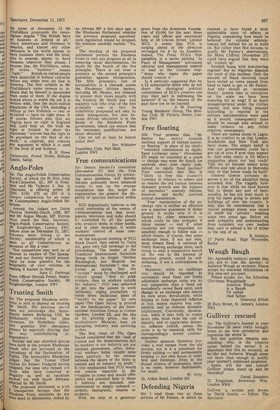Free floating
SIR: Your premise that "Mr Barber has movea towards cautious support of limited currency floating" in place of his chief's "erstwhile commitment to rigidly fixed e occhange rates " (November 27) might be conceded at a pinch — though was even Mr Heath (or anybody else) ever really committed to rigidly fixed parities? Your conclusion that this is "likely to free this country's currency in relation to others and so remove the old tension between domestic growth and the balance' of payments" scarcely follows, however, and hardly survives critical examination.
' Free ' manipulation of the exchange rate is neither an effective nor a painless guarantee of faster growth. It works only if it is backed by other measures — which could be less stringent if taken sooner — and if other countries are not misguided (or sensible) enough to follow suit — which means, of course, that some exchange rates, if not our own, must remain fixed. A universe of freely floating exchange rates, each trying to steal a competitive march on the rest in the interest of exported growth, would be selfdefeating, if not a contradiction in terms.
Moreover, while no exchange rate should be regarded as sacrosanct (and fixed yet freely adjustable exchange rates are no less compatible than a fixed yet periodically varied Bank rate), each change in an exchange rate exacts its own price. Revaluation, while helping to keep imported inflation at bay, makes exports less competitive, and so reduces domestic employment. Conversely, devaluation, while it may help to create more jobs, must raise the cost of imports, and so aggravates domestic inflation (which, unless the cycle is to be repeated, calls for correspondingly severe countermeasures).
Neither measure therefore provides a real escape from the old tension, nor is it a substitute for firmly putting — and permanently keeping — our own house in order first and foremest. Even in the dismal science of economics, there is no room, however fashionable, for magic. W. Grey 12, Arden Road, London N3










































 Previous page
Previous page